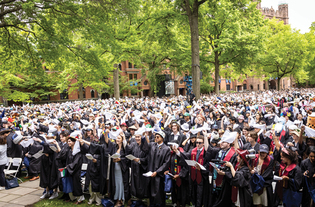
Dan Renzetti
More than 4,000 students became Yale University graduates at Yale’s 323rd commencement ceremony, held on Old Campus on May 20 under a bright blue sky. The soon-to-be graduates filed into the traditional rows of white chairs, which stretched all the way back to Vanderbilt. On the day before, Class Day speaker Vice Admiral Vivek H. Murthy ’03MD, ’03MBA—the United States surgeon general—had extolled the fact that “the togetherness that has come to define your class didn’t just happen.” He referenced the many members of the Class of ’24 who had started their time at Yale online, in the early days of the COVID lockdown, and he declared, “It’s just one of the many reasons we are so incredibly proud of you today.”
Several dozen students and faculty members walked out of the ceremony as Yale College dean Pericles Lewis officially presented the graduates to Yale president Peter Salovey ’86PhD; it was a reminder of the pro-Palestinian protests that had roiled college campuses across the country this past spring. But by the end of the day, Yale College had conferred 1,709 degrees, the graduate and professional schools had conferred 2,687 degrees, and the university had conferred nine
honorary degrees. Among those nine degrees: one for President Salovey, who was awarded a doctor of humane letters.
In his Baccalaureate Address one day earlier, Salovey had urged his audience to try to bridge their differences “by daring to choose love and compassion over rage and hate.”
_________________________________________________________________
Recipients of teaching prizes
David Blight, Sterling Professor of History and African American Studies: the Sidonie Miskimin Clauss Prize for teaching excellence in the humanities.
Sarah Demers, Professor of Physics: the Dylan Hixon ’88 Prize for teaching excellence in the natural sciences.
John Lafferty, John C. Malone Professor of Statistics and Data Science: the Lex Hixon ’63 Prize for teaching excellence in the social sciences.
Carlos Eire ’79PhD, T. Lawrason Riggs Professor of History and Religious Studies: the Harwood F. Byrnes/Richard B. Sewall Teaching Prize, awarded to any faculty member who over a long period of service has inspired a great number of students and consistently fostered the learning process both inside and outside the classroom.
Adriane Steinacker, Senior Lecturer in Physics: the Richard Brodhead ’68 Prize for teaching excellence by instructional faculty.
Margherita Tortora, Senior Lector II in Spanish: the Richard H. Brodhead ’68 Prize for teaching excellence by instructional faculty.
________________________________________________________________
Recipients of honorary degrees
Mahzarin R. Banaji, social psychologist, “groundbreaking scholar whose pioneering work has helped establish the role that unconscious processes play in governing human social action”: Doctor of Social Science.
Stephen Breyer, jurist, retired associate justice of the US Supreme Court, known for a “pragmatic philosophy, a belief that the judiciary must adapt to changing society and consider real-world consequences for human beings when deciding cases”: Doctor of Laws.
Mario Capecchi, Nobel Prize–winning molecular geneticist and Holocaust survivor, “inspiring scientist whose life lessons teach us all”: Doctor of Science.
Risa Lavizzo-Mourey, health policy leader, “trailblazing physician, geriatrician,” who has devoted her career to “empowering communities and corporations to make equitable health care a shared value”: Doctor of Medical Sciences.
László Lovász, mathematician and computer scientist, “the Abel Prize–decorated mathematician renowned for his leadership in the field of combinatorics”: Doctor of Engineering and Technology.
Judith Rodin, global thought leader, “the research psychologist, thought leader, and philanthropic strategist who in 1994 became the first woman president of an Ivy League university”: Doctor of Humane Letters.
Peter Salovey ’86PhD, President of Yale University, Yale’s 23rd president “will enter history as the Yale professor who has held more senior leadership positions at the university than anyone in its 322-year history”: Doctor of Humane Letters.
Hortense Spillers, “teacher, scholar, literary critic, writer—is recognized as the most consequential theorist in Black feminist and humanist inquiry”: Doctor of Humanities.
Kehinde Wiley ’01MFA, visual artist, “internationally renowned painter and sculptor . . . whose arresting portraits . . . break the category, depicting ‘common’ people in traditional styles that raise questions about privilege, power, authority, and representation”: Doctor of Fine Arts.
 loading
loading